Hundreds of animals are being cared for by humane groups in Southern California as this week's fast-moving wildfires continue to displace residents.
“This is clearly not something that will be resolved in a day, a week,” said Ana Bustilloz, director of communications and marketing at the Society for the Prevention of Cruelty to Animals Los Angeles, or spcaLA, a local animal welfare organization. “We’re at the ready to assist.”
From cats and dogs to horses, birds and tortoises, several rescue groups are hosting a menagerie of animals while the blazes hopscotch throughout the Los Angeles area. Some pets are staying as temporary boarders while the humans in their households stay in evacuation centers, hotels or other places that don’t allow pets. Other animals are receiving treatment for injuries.
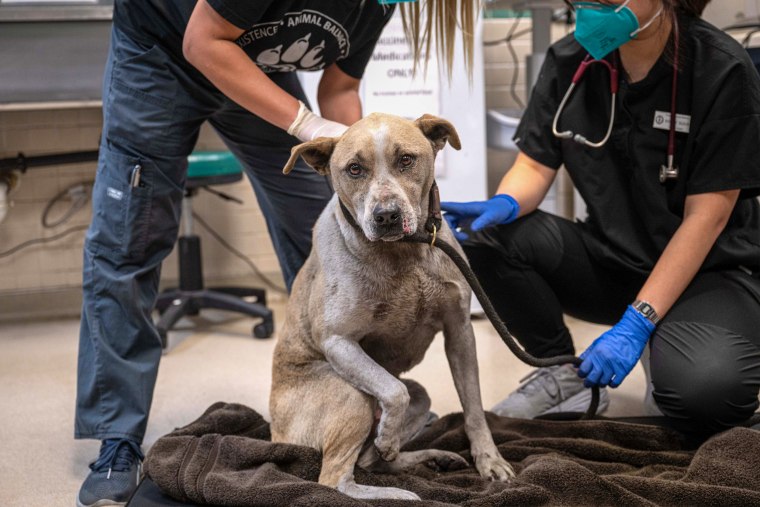 A dog with burned paws receives care at Pasadena Humane, an animal center in Pasadena, California.Courtesy Pasadena Humane
A dog with burned paws receives care at Pasadena Humane, an animal center in Pasadena, California.Courtesy Pasadena Humane“We’ve taken in some animals that were found stray near the fire areas, who have come in with burns, singed paws, singed whiskers, dehydration,” said Dia DuVernet, president and CEO of Pasadena Humane, an animal resource center in Pasadena. “It’s just been a huge community effort to try to figure out how we are going to respond to all the human and animal needs in our community.”
She said that, so far, Pasadena Humane has taken in over 400 animals. Among the most severely injured are ones being treated for dehydration and smoke inhalation, some of whom are on oxygen at the center’s veterinary intensive care unit.
The group has not had to turn anyone down who is looking for a place to keep their pet.
“It has been cats, dogs, birds, goats,” DuVernet said. “One desperate owner of a pony actually walked their pony down from the affected area to our shelter, where we cared for it until we could transport it to an equestrian center.”
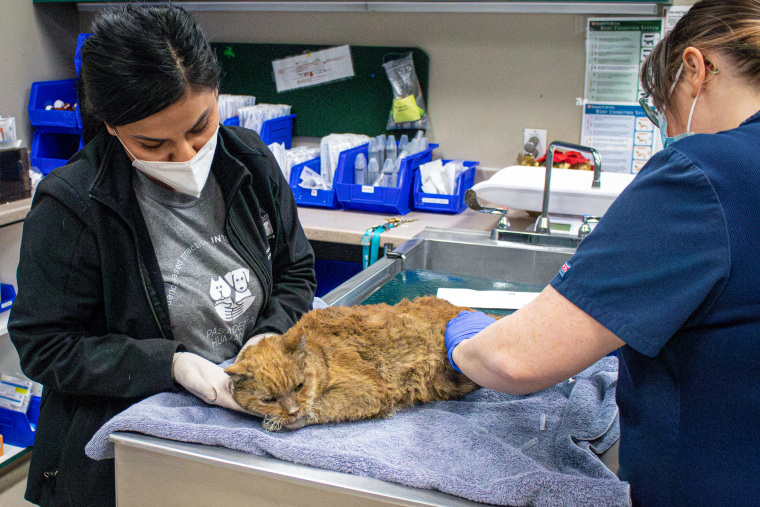 A Cat who received burns is treated at Pasadena Humane.Courtesy Pasadena Humane
A Cat who received burns is treated at Pasadena Humane.Courtesy Pasadena HumaneThe Los Angeles wildfires have killed at least 11 people, and well over 100,000 remained under evacuation orders Friday, according to authorities. Animal welfare groups in the area said the number of pets they have housed has fluctuated throughout the week but they worry it could rise.
“There’s going be way more animals displaced because there’s way more people displaced,” said Christi Metropole, president and CEO of Stray Cat Alliance, a Los Angeles-based cat rescue organization. “This is the calm before the storm.”
Owners have dropped off about 50 pets for temporary boarding at spcaLA, Bustilloz said. Among them are dogs, cats and a 30-year-old parrot named Ducky — who has delighted staff with the phrases she says, like, “I’m a pretty birdie!”
When the animals arrive at spcaLA, a veterinarian examines them and they receive blankets, calming toys and treats to make them feel as at home as possible, Bustilloz said.
“As time goes on, I’m sure we’ll find ourselves doing different things. But for now, this is what we’re doing,” she said. “The comfort that we can provide someone who is in distress, just knowing that their animals are cared for and safe, hopefully will give them a little reprieve so they can focus on other things they need to take care of.”
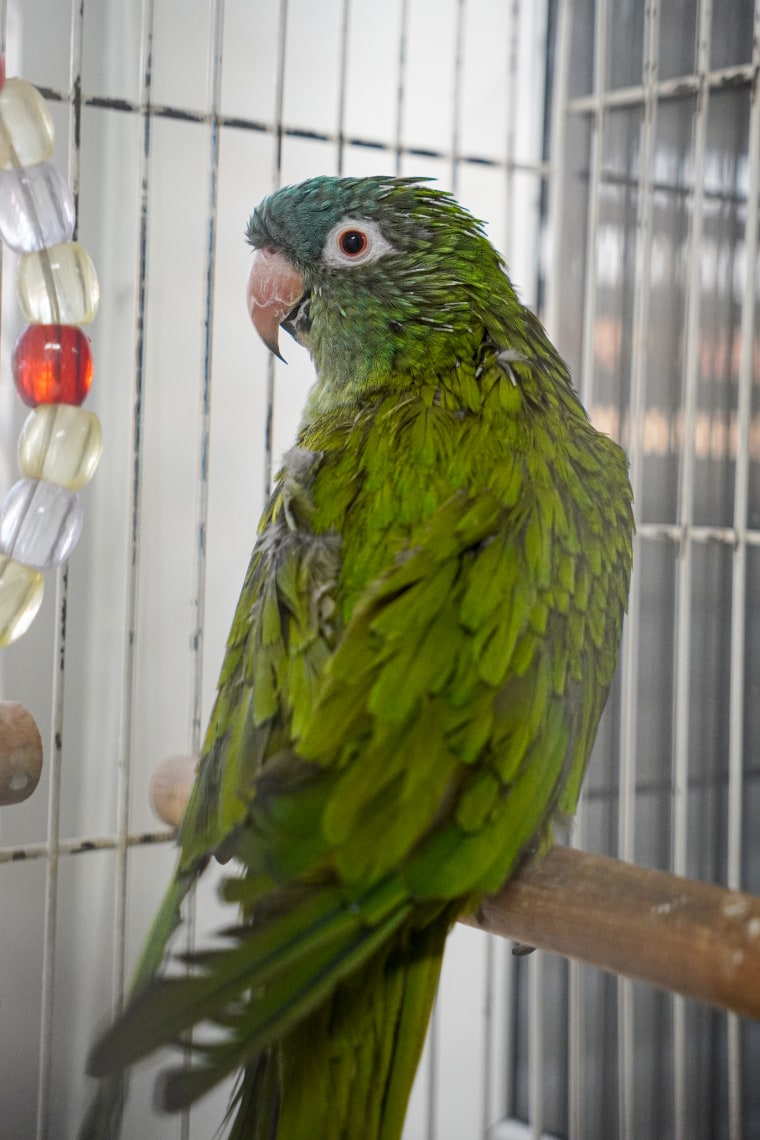 Ducky the parrot, one of many pets whose families evacuated.Courtesy spcaLA
Ducky the parrot, one of many pets whose families evacuated.Courtesy spcaLAWildfires and the particulates they release can be hazardous to pets, particularly animals with cardiovascular or respiratory illnesses, according to the American Veterinary Medical Association. The group says pets should be kept indoors as much as possible when the air is smoky. It advises all pet owners to have an evacuation kit on hand with three to seven days’ worth of pet food, a pet carrier labeled with contact information, a collapsible feeding dish and water bowl, and other necessities.
The rescue groups who spoke to NBC News are not in evacuation zones, but said they are only taking animals outside for brief periods this week for their safety.
A little further out from Los Angeles, in Burbank, the Los Angeles Equestrian Center is also paying close attention to air quality. In the last week, the municipal recreation and park center that normally houses 500 horses received 200 to 300 additional horses from private homes or other equestrian centers where the smoke and fire posed a serious danger, said Jennie Nevin, the center’s executive director of business development and communication.
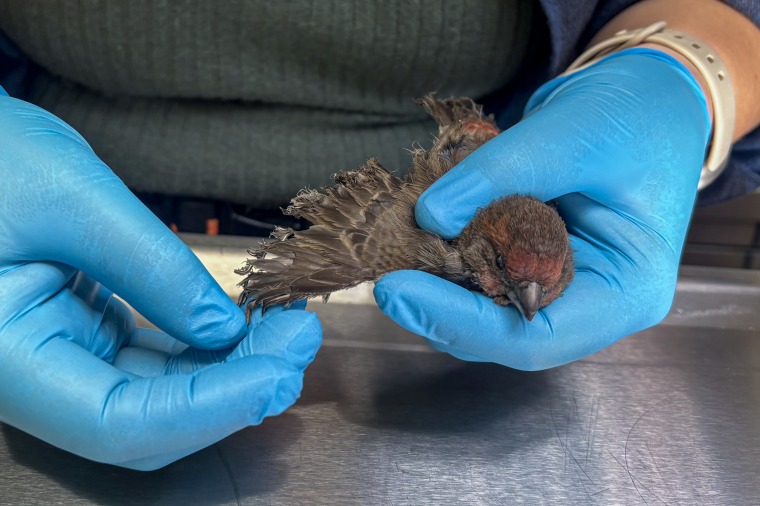 Pasadena Humane also treats wildlife, including this burned bird.Courtesy Pasadena Humane
Pasadena Humane also treats wildlife, including this burned bird.Courtesy Pasadena Humane“It goes in and out,” she said of the smoke in the Burbank area. “With the winds changing, we’ve had some pretty bad air quality, and then today we’ve seen a bit of relief.”
The Los Angeles Equestrian Center is equipped to handle other large animals, too. Earlier this week it welcomed Oliver, a pet pig estimated to weigh over 200 pounds, when his Pasadena-based owners struggled to find anywhere else to keep him.
The rescue centers said they have been overwhelmed with donations, including bales of hay, blankets and pet food. Pasadena Humane has received so many donated pet supplies that it fears it will run out of room to host more animals in need, DuVernet said, and has started asking for only monetary donations going forward.
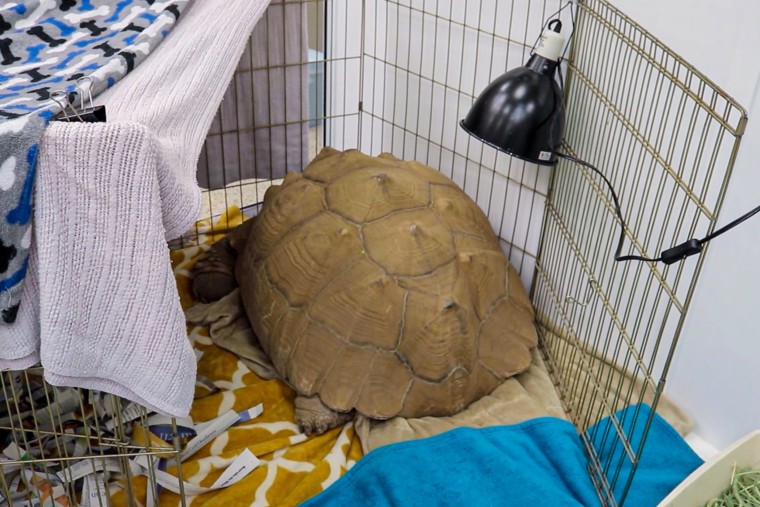 A pet tortoise staying at Pasadena Humane.Courtesy Pasadena Humane
A pet tortoise staying at Pasadena Humane.Courtesy Pasadena HumaneSome owners who evacuated earlier in the week have received the all-clear to return home and have come to pick up their pets, said spcaLA’s Bustilloz. Seeing pets reunited with their families has been the silver lining to an otherwise stressful week.
“It just feels like a small step in the right direction,” Bustilloz said.
.png)
 2 hours ago
9
2 hours ago
9






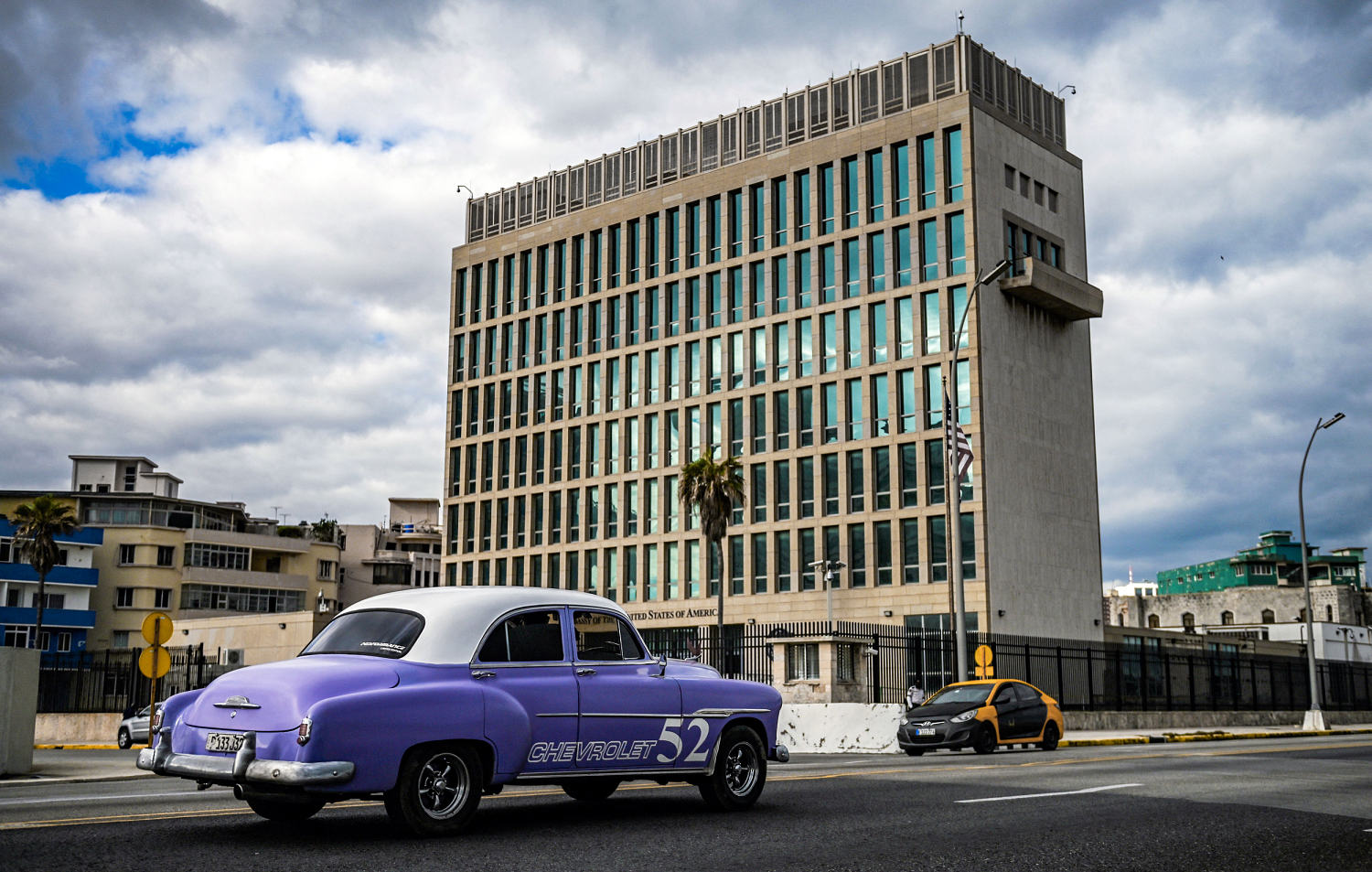



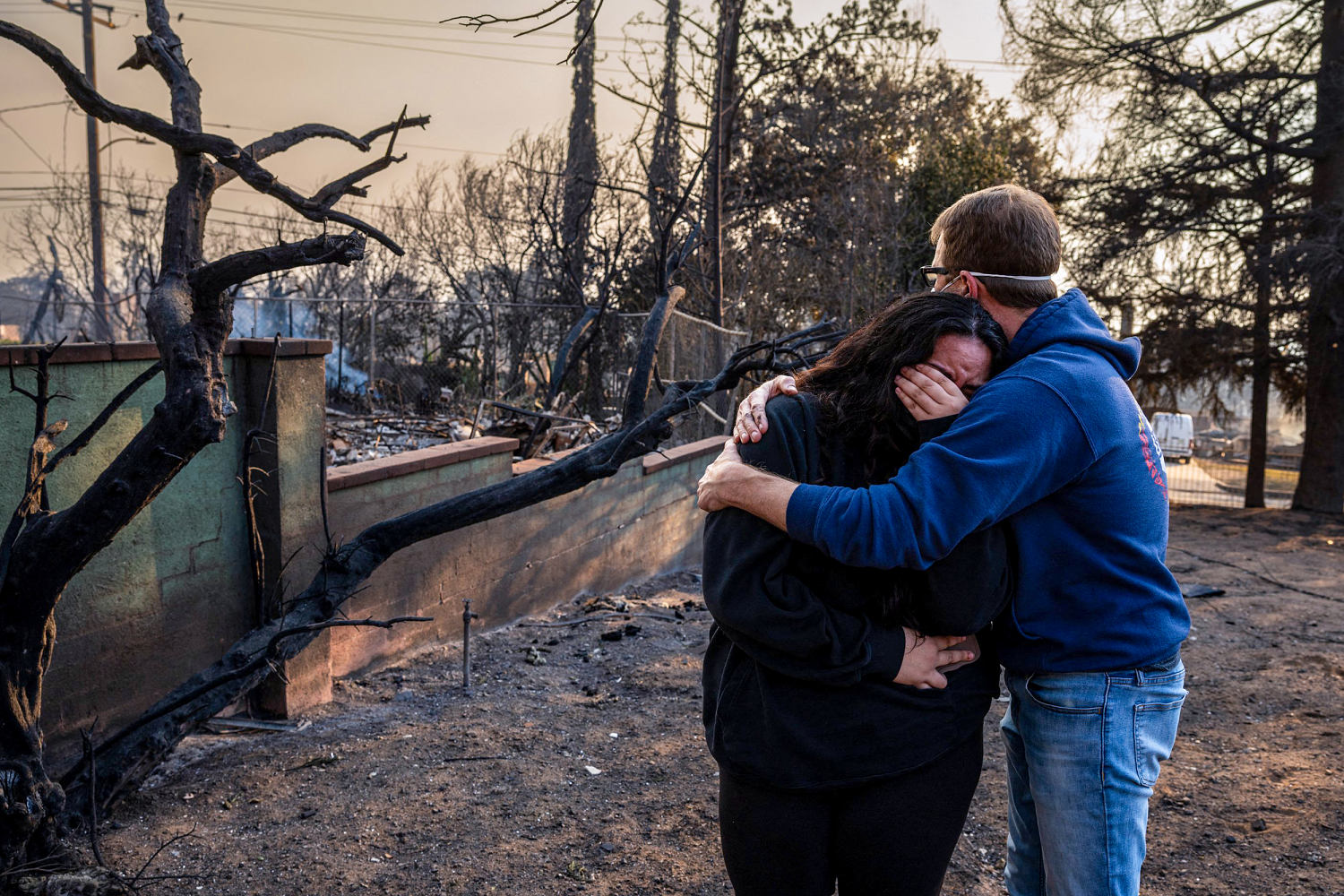























 Bengali (BD) ·
Bengali (BD) ·  English (US) ·
English (US) ·